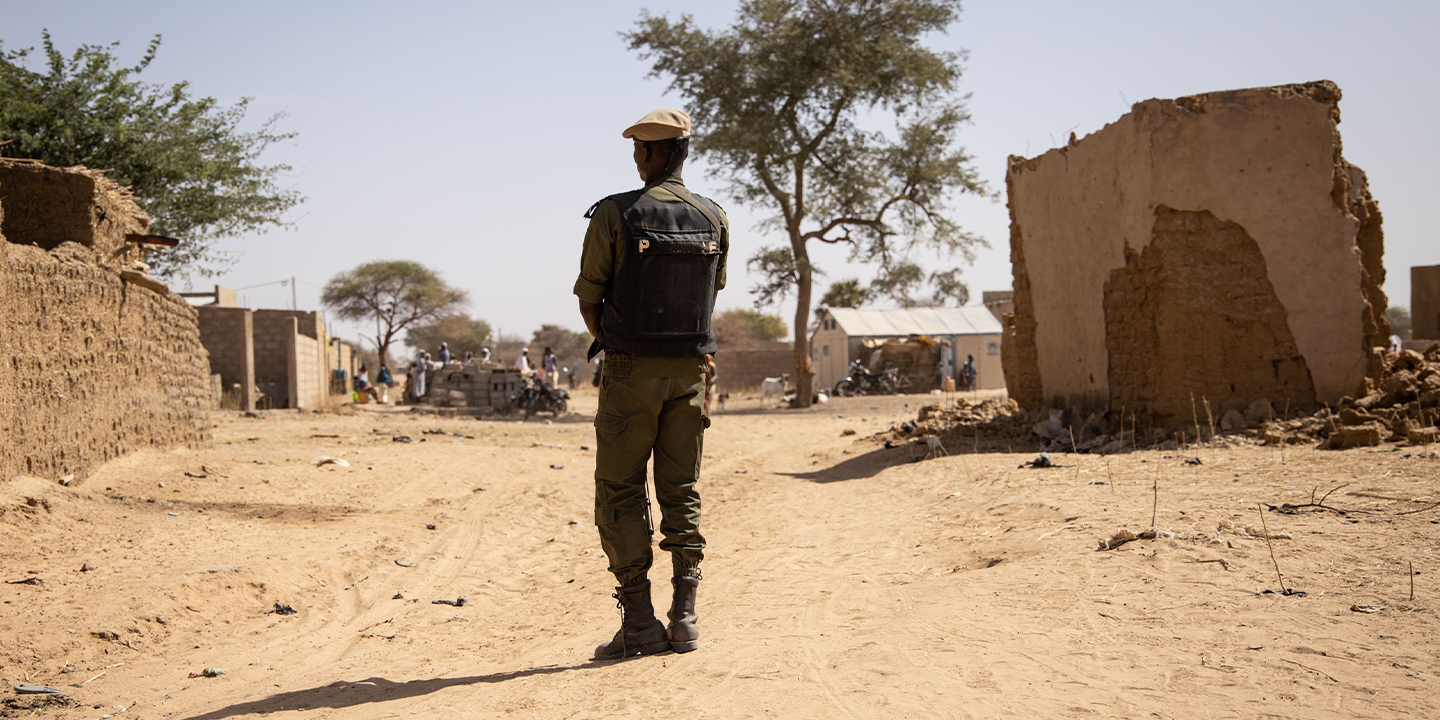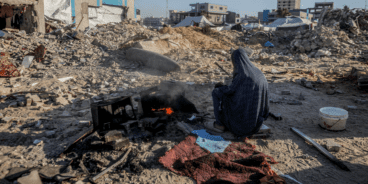

Atrocity Alert No. 393: Burkina Faso, Venezuela and Ethiopia
Atrocity Alert is a weekly publication by the Global Centre for the Responsibility to Protect highlighting situations where populations are at risk of, or are enduring, mass atrocity crimes.
NEW REPORT DETAILS LATEST CIVILIAN MASSACRE IN BURKINA FASO
More than 220 civilians, including 56 children, were summarily executed by Burkina Faso’s military in two villages on a single day in late February, according to a new investigative report by Human Rights Watch. Following a string of attacks by armed Islamist groups on military targets in the north, on 25 February Burkinabè soldiers killed 44 villagers in Nondin and 179 people in nearby Soro. Soldiers reportedly shot villagers who had been rounded up or who tried to flee or hide. Survivors recount that they were accused of aiding armed Islamist fighters, which is a routine and unfair accusation the military makes against civilians living in areas where these groups operate. The authorities have dismissed the report’s findings as “baseless” while the Superior Council of Communications has suspended several international news organizations, some for an indefinite period, due to their coverage of the report.
Burkina Faso has been ruled by the military since a coup in 2022, promising to end the Islamist insurgency which has plagued the country for nearly a decade. However, violence has escalated and spread, and civilian protection has severely deteriorated since the military seized power. Conflict-related fatalities doubled in 2023 alone. UN High Commissioner for Human Rights Volker Türk – who visited Burkina Faso in late March – reported that large swathes of the country “are being terrorized by armed groups.” Over 1 million people are living in areas fully or partially besieged by such groups, where they perpetrate serious abuses and likely war crimes with disastrous consequences for civilians and their livelihoods.
Violations and repressive measures stifling civic space have also significantly increased under the military junta. In response to the growing threat of armed Islamist groups, the military has scaled up counterinsurgency operations and at times been linked to mass killings of civilians with complete impunity, as well as other grave crimes, including enforced disappearances and indiscriminate airstrikes. According to the report, the massacres in Nondin and Soro are among the worst abuses carried out by the military since 2015 and may amount to crimes against humanity. The junta is also cracking down on independent media to cover up such abuses, while local journalists routinely self-censor, according to Reporters Without Borders.
Marta Hurtado, Spokesperson for the Office of the UN High Commissioner for Human Rights, stressed, “Perpetrators need to be held accountable and victims’ rights to truth, justice and reparations must be upheld. Fighting impunity and pursuing accountability is paramount…” The military and members of the government-sponsored Volunteers for the Defense of the Homeland must carry out all operations in strict compliance with international humanitarian and human rights law, ensuring that counterterrorism objectives do not negate universal human rights protections. The Burkinabè authorities should immediately lift all restrictions on media freedom and civic space, including by unblocking all outlets wrongly censored, to ensure the right of access to information is upheld.
NEED FOR ONGOING INTERNATIONAL SCRUTINY ON ATROCITY CRIMES IN VENEZUELA
On 24 April Chief Prosecutor of the International Criminal Court (ICC) Karim Khan concluded his latest visit to Venezuela, during which he inaugurated an in-country office. In an official statement, Chief Prosecutor Khan welcomed the government’s agreement for the return of a technical team of the Office of the Prosecutor (OTP) to Caracas. He also emphasized that the Court’s investigation into possible crimes against humanity will be pursued “simultaneously, and without delay.” The OTP opened an investigation in November 2021, one year after a Human Rights Council-mandated Fact-Finding Mission (FFM) on Venezuela warned that state agents have perpetrated possible crimes against humanity since at least 2014 “as part of a plan orchestrated at the highest level of government to repress dissent.” President Nicolás Maduro’s government has repeatedly attempted to derail ICC investigations while refusing to engage with the FFM.
Chief Prosecutor Khan’s fourth official visit to Venezuela came at a time of rapidly intensifying government repression ahead of the presidential elections scheduled for 28 July. During March the FFM warned that authorities have reactivated “the most violent form of repression” aimed at silencing opposing voices. State authorities have engaged in a systematic campaign to crush political dissent, including by blocking the leading opposition candidate, María Corina Machado, from participating in the upcoming election.
Since January the government has also resorted to an increasing number of enforced disappearances and arbitrary detentions, as well as systematic attacks against civic space. On 30 April the UN Working Group on Enforced or Involuntary Disappearances warned that opposition members and the military are the primary targets of enforced disappearances this year, which “appear to follow a pattern whereby individuals are deprived of their liberty by State authorities, taken to recognized detention facilities and denied fundamental rights and protections.” Following the Office of the UN High Commissioner for Human Rights’ (OHCHR) denunciation of the short-term enforced disappearance of a prominent human rights defender, on 15 February Venezuelan authorities gave its team 72 hours to leave the country. While OHCHR staff have continued monitoring and reporting from Panama, its suspension has resulted in a critical protection gap for affected communities across Venezuela. Chief Prosecutor Khan has welcomed President Maduro’s intention to invite OHCHR to return to Venezuela, who conditioned this possibility on “overcoming their differences and conflict.”
While prospects of cooperation with the ICC and OHCHR provide vital entry points for the international community to push for meaningful, transparent and genuine engagement by the Venezuelan authorities with independent monitoring and protection mechanisms, intensifying repression and targeted persecution all constitute early warning signs of a rapidly deteriorating situation and a possible recurrence of atrocity crimes ahead of the electoral period. UN member states – including regional countries – should exert concerted diplomatic and political pressure to ensure the government reverts its repressive policies against actual or alleged opponents, refrains from ongoing attempts to derail ICC investigations and agrees to an effective OHCHR presence in Caracas, complimentary to ongoing investigations into crimes against humanity by the FFM and the ICC.
RENEWED CONFLICT IN DISPUTED TERRITORY OF NORTHERN ETHIOPIA DISPLACES 50,000
In an update posted on 22 April, the UN Office for the Coordination of Humanitarian Affairs noted that over 50,000 people – the majority of whom are women, children and the elderly – have been displaced due to clashes in disputed areas of Ethiopia’s Tigray region. The fighting occurred in and around Alamata Town, including Raya Alamata, Zata and Ofla woreda’s, which is territory claimed by both Tigray and the neighboring Amhara region. During the two-year war in Tigray, Amhara regional forces occupied and remained in control of the area. Despite the Cessation of Hostilities Agreement (CoHA) signed by the federal government and the Tigrayan People’s Liberation Front in November 2022, the administration of this disputed territory, and others in Western Tigray, has yet to be decided.
The fighting has sparked alarm among the international community. On 25 April the Chairperson of the African Union Commission, Moussa Faki Mahamat, released a statement calling on “both sides to urgently halt hostilities and ensure the safety of civilians to end the renewed displacement of the local population.” Chairperson Mahamat further called “for the commencement of the political dialogue, which is the most viable means to respond to the issues of contested areas, as stipulated in the CoHA.”
During the war in northern Ethiopia, all parties to the conflict perpetrated widespread violations of international humanitarian and human rights law, including the commission of war crimes and crimes against humanity. Several UN bodies and international human rights groups documented indiscriminate bombings, ethnic-based killings, sexual violence, forced displacement and the systematic destruction of food, water and health infrastructure, among other crimes, while Amnesty International and Human Rights Watch found evidence of the ethnic cleansing of Tigrayans from Western Tigray.
Meanwhile, violence has escalated elsewhere across the country since the CoHA, including in Amhara and Oromia regions. Civilians along the border areas between Tigray and Eritrea continue to endure abuses at the hands of occupying Eritrean Defense Forces – who were allied with the federal government during the conflict – while long-standing drivers of intermittent inter-communal conflict have recently flared.
The complete, good-faith implementation of the CoHA is critical to defuse renewed tensions and prevent vulnerable civilians from the risk of further atrocities. The international community must continue to pressure the federal government and all parties to Ethiopia’s myriad conflicts to commit to dialogue. Ethiopia expert at the Global Centre for the Responsibility to Protect, Sarah Hunter, said, “Last month’s approval by the Council of Ministers on the long-awaited transitional justice policy is a significant milestone, but the government has yet to prove itself on implementation. Accountability, including through community-based, victim-centric reconciliation and reparation processes, is essential for both lasting peace and to ensure victims receive the closure they deserve.”
Related Content


Atrocity Alert No. 443: Sudan, Israel and the Occupied Palestinian Territory and United States Travel Ban
